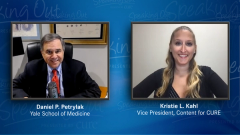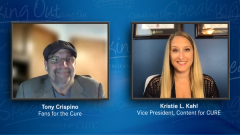
Addressing Long-Term Side Effects From Prostate Cancer With Providers
As part of its Speaking Out video series, on behalf of Fans for the Cure, CURE® spoke with Dr. Daniel P. Petrylak about the long-term effects associated with a prostate cancer diagnosis.
Episodes in this series

Kristie L. Kahl: To start, what are some of the most common long-term side effects associated with prostate cancer?
Dr. Daniel P. Petrylak: So these are all different in terms of which treatment is administered. So, with radical prostatectomy, the major side effects are impotence and incontinence. We know that patients do regain some continence over time, as well as their potency. It generally takes about six months to really start regaining your potency after surgery. But from a local treatment standpoint with prostatectomy, the most common (long-term effects is) incontinence, (which) can range from dribbling to the need for pads to prevent leakage. But there are exercises and other ways that you can overcome these particular issues.
In terms of radiation therapy, it's not too dissimilar; incontinence and impotence are seen as well, but the potency patterns are very different. If you use radiation therapy as a single treatment, you tend to lose your potency over time and at two years it's about a 50% rate of impotence in patients treated with radiation therapy.
In terms of androgen deprivation therapy, we have other side effects, some of which we can mitigate and others that we can't. The ones that we can (mitigate) are bone health, muscle mass and weight. So in terms of bone health, if a patient has been treated with androgen deprivation therapy…if they have no metastatic disease, the DEXA scan can give me an estimation of their bone mineral density. With hormone therapy, you can rapidly lose bone mineral density, and I recommend that all patients go on calcium and vitamin D to prevent that problem, or at least help prevent the problem. If osteoporosis or osteopenia is identified depending upon the degree, one may want to also add an anti-resorptive agent to help to prevent that issue. Exercise, moderation of alcohol, all these will affect bone mineral density. In terms of muscle mass, you can rapidly lose muscle mass on androgen deprivation therapy. And the best way to combat that is to be active, to lift weights, to also aerobically exercise as well. I think we really underestimate how significant the loss of muscle mass can be, not only a patient with prostate cancer, but in patients who age. There was a book that was written by a friend of mine, who was a lawyer, Fred Bartlett, very, very interesting fellow. He's 86 years old. He looks like he's 65 and he pumps iron every day. And this book is about his experience called The Strong Path. His experience with weightlifting and habits helped him and you know, as we get older, we can fall more, there are other issues and one of the most common causes of death in the elderly is a fall. Weight gain, so the weight that's gained is predominantly in the belly. You can again try to avoid that with exercise, keep the carbohydrates in your diet low, moderate your calories. For a normal man who's not on hormone therapy with a normal testosterone axis, for them to lose a pound they have to burn 3,500 calories. A man on androgen deprivation therapy (you have to burn) 4,500 (calories). So low carbs, a lot of chicken, a lot of fish, you can have red meats, but in moderation.
Kahl: When it comes to some of these side effects, how does the multidisciplinary approach play a role, especially when it comes to more use of integrative medicine nowadays?
Petrylak: I think that we really have not used (the multidisciplinary approach) to the full ability – nutritionists, physical therapists – because these health care professionals are essential to maintaining good quality of life. Additionally, in terms of continence and in terms of potency, the urologist does have a significant role in helping our patients maintain a good quality of life in that respect. So using all aspects of the health care system are important to taking good care of patients in the situation.
Kahl: How can we help educate patients on the long-term side effects so that way they know what to look for and they're proactive about coming to their providers and asking about them.
Petrylak: Well, I mean, I think that right off the bat, if I anticipate somebody's going to go on hormone therapy, we start that discussion six months before they actually go on (therapy), because if they start putting those good habits in at the beginning, it's going to be easier to maintain them. Especially if you get fatigued from androgen deprivation therapy, the urge is not to exercise. And in fact, that actually can help tremendously to get people's energy back. So it's just important to be as on top of the patient's weight, on top of the patient's diet, and really understand how they're doing in terms of their work life, in their home life.
Kahl: To bring it all together, what would you say is your biggest piece of advice for patients when it comes to long-term side effects that they might be experiencing?
Petrylak: Talk to your doctor, ask for help from specialists, such as nutritionists and physical therapists, seek out the advice of people who know how to manage the side effects. And if you're not feeling right, let us know. Because we're here to help.
Transcription edited for clarity and conciseness.









